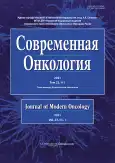The phenomenon of pseudoprogression in cancer immunotherapy: is everything so unambiguous?
- Authors: Sarzhevskiy V.O.1, Melnichenko V.I.1, Panshina I.V.1, Mochkin N.E.1, Bogatyrov V.S.1, Borshevetskaya M.M.1, Smirnova E.G.1, Bannikova A.E.1, Samoylova A.A.1, Mamedova A.A.1, Rukavitsin A.A.1, Vasilev S.S.1, Bronov O.I.1
-
Affiliations:
- Pirogov National Medical and Surgical Center
- Issue: Vol 23, No 3 (2021)
- Pages: 496-500
- Section: CLINICAL ONCOLOGY
- URL: https://bakhtiniada.ru/1815-1434/article/view/88627
- DOI: https://doi.org/10.26442/18151434.2021.3.200952
- ID: 88627
Cite item
Full Text
Abstract
When evaluating the effect of therapy for malignant neoplasms with inhibitors of CTLA-4, PD-1 and PD-L1, the phenomenon of pseudoprogression may occur. Pseudoprogression is an increase in the volume of tumor tissue due to immunocompetent cells (lymphocytes, macrophages) mobilized into the tumor focus under the action of immunotherapy. As the antitumor effect of lymphocytes and macrophages is realized, the tumor decreases or disappears over time. Pseudoprogression occurs with varying frequency in various types of cancer. It may also matter which immune checkpoint inhibitors is used to treat a solid tumor or lymphoproliferative disease. Currently, several immune-related response-evaluation criteria have been developed, which can help diagnose the phenomenon of pseudoprogression. But, unfortunately, none of these criteria clearly distinguish pseudoprogression from true tumor progression. In the case of an erroneous judgment about the effect of treatment, immunotherapy ends, and the patient may not get a chance for long-term remission. Using two clinical examples (immunotherapy for metastatic kidney cancer and recurrent Hodgkin lymphoma), the authors discuss the pitfalls of evaluating the effectiveness of treatment with checkpoint inhibitors.
Keywords
Full Text
##article.viewOnOriginalSite##About the authors
Vladislav O. Sarzhevskiy
Pirogov National Medical and Surgical Center
Author for correspondence.
Email: vladsar100@gmail.com
ORCID iD: 0000-0001-7164-6595
D. Sci. (Med.), Prof.
Russian Federation, MoscowVladimir Ia. Melnichenko
Pirogov National Medical and Surgical Center
Email: vladsar100@gmail.com
ORCID iD: 0000-0002-6728-6264
D. Sci. (Med.), Prof.
Russian Federation, MoscowIrina V. Panshina
Pirogov National Medical and Surgical Center
Email: vladsar100@gmail.com
ORCID iD: 0000-0001-7529-0047
Department Head
Russian Federation, MoscowNikita E. Mochkin
Pirogov National Medical and Surgical Center
Email: vladsar100@gmail.com
ORCID iD: 0000-0001-5622-0828
Cand. Sci. (Med.)
Russian Federation, MoscowVladimir S. Bogatyrov
Pirogov National Medical and Surgical Center
Email: vladsar100@gmail.com
ORCID iD: 0000-0001-6061-9428
hematologist
Russian Federation, MoscowMaria M. Borshevetskaya
Pirogov National Medical and Surgical Center
Email: vladsar100@gmail.com
ORCID iD: 0000-0001-5376-6497
oncologist
Russian Federation, MoscowElena G. Smirnova
Pirogov National Medical and Surgical Center
Email: vladsar100@gmail.com
ORCID iD: 0000-0003-1114-2592
hematologist
Russian Federation, MoscowAnna E. Bannikova
Pirogov National Medical and Surgical Center
Email: vladsar100@gmail.com
ORCID iD: 0000-0003-3697-6876
hematologist
Russian Federation, MoscowAnastasia A. Samoylova
Pirogov National Medical and Surgical Center
Email: vladsar100@gmail.com
ORCID iD: 0000-0002-3876-3869
hematologist
Russian Federation, MoscowAysel A. Mamedova
Pirogov National Medical and Surgical Center
Email: vladsar100@gmail.com
ORCID iD: 0000-0002-7296-9190
hematologist
Russian Federation, MoscowAnatolij A. Rukavitsin
Pirogov National Medical and Surgical Center
Email: vladsar100@gmail.com
ORCID iD: 0000-0002-5027-6932
Cand. Sci. (Med.)
Russian Federation, MoscowSergei S. Vasilev
Pirogov National Medical and Surgical Center
Email: vladsar100@gmail.com
ORCID iD: 0000-0003-0118-7383
oncologist
Russian Federation, MoscowOleg Iu. Bronov
Pirogov National Medical and Surgical Center
Email: vladsar100@gmail.com
ORCID iD: 0000-0002-2784-302X
Cand. Sci. (Med.)
Russian Federation, MoscowReferences
- Di Giacomo AM, Danielli R, Guidoboni M, et al. Therapeutic efficacy of ipilimumab, an anti-CTLA-4 monoclonal antibody, in patients with metastatic melanoma unresponsive to prior systemic treatments: clinical and immunological evidence from three patient cases. Cancer Immunol Immunother. 2009;58(8):1297-306.
- Chiou VL, Burotto M. Pseudoprogression and immune-related response in solid tumors. J Clin Oncol Off J Am Soc Clin Oncol. 2015;33(31):3541-3.
- Dercle L, Seban RD, Lazarovici J, et al. 18F-FDG PET and CT scans detect new imaging patterns of response and progression in patients with hodgkin lymphoma treated by anti-programmed death 1 immune checkpoint inhibitor. J Nucl Med Off Publ Soc Nucl Med. 2018;59(1):15-24.
- Wolchok JD, Hoos A, O’Day S, et al. Guidelines for the evaluation of immune therapy activity in solid tumors: immune-related response criteria. Clin Cancer Res. 2009;15(23):7412-20.
- Hodi FS, Hwu WJ, Kefford R, et al. Evaluation of immune-related response criteria and RECIST v1.1 in patients with advanced melanoma treated with pembrolizumab. J Clin Oncol. 2016;34(13):1510-7.
- Queirolo P, Spagnolo F. Atypical responses in patients with advanced melanoma, lung cancer, renal-cell carcinoma and other solid tumors treated with anti-PD-1 drugs: A systematic review. Cancer Treat Rev. 2017;59):71-8.
- Mokrane FZ, Chen A, Schwartz LH, et al. Performance of CT Compared with 18F-FDG PET in Predicting the Efficacy of Nivolumab in Relapsed or Refractory Hodgkin Lymphoma. Radiology. 2020;295(3):651-61.
- Sarzhevskii VO, Demina EA, Mochkin NE, et al. Checkpoint inhibitors and classical Hodgkin’s lymphoma: efficacy and safety of pembrolizumab in relapsed/refractory tumor (experience at the NI Pirogov Russian National Medical Center of Surgery). Clin Oncohematology. 2021;14(1):53-62.
- Pignon JC, Jegede O, Shukla SA, et al. irRECIST for the evaluation of candidate biomarkers of response to nivolumab in metastatic clear cell renal cell carcinoma: analysis of a phase II prospective clinical trial. Clin Cancer Res. 2019;25(7):2174-84.
- Seymour L, Bogaerts J, Perrone A, et al. iRECIST: guidelines for response criteria for use in trials testing immunotherapeutics. Lancet Oncol. 2017;18(3):e143-52.
- Younes A, Hilden P, Coiffier B, et al. International Working Group consensus response evaluation criteria in lymphoma (RECIL 2017). Ann Oncol. 2017;28(7):1436-47.
- Cheson BD, Byrd JC, Rai KR, et al. Refinement of the Lugano Classification lymphoma response criteria in the era of immunomodulatory therapy. Blood. 2016;128(21):2489-96.
- Ma Y, Wang Q, Dong Q, et al. How to differentiate pseudoprogression from true progression in cancer patients treated with immunotherapy. Am J Cancer Res. 2019;9(8):1546-53.
- Guibert N, Mazieres J, Delaunay M, et al. Monitoring of KRAS-mutated ctDNA to discriminate pseudo-progression from true progression during anti-PD-1 treatment of lung adenocarcinoma. Oncotarget. 2017;8(23):38056-60.
- Lee JH, Long GV, Menzies AM, et al. Association between circulating tumor DNA and pseudoprogression in patients with metastatic melanoma treated with anti-programmed cell death 1 antibodies. JAMA Oncol. 2018;4(5):717-21.
- Sanmamed MF, Perez-Gracia JL, Schalper KA, et al. Changes in serum interleukin-8 (IL-8) levels reflect and predict response to anti-PD-1 treatment in melanoma and non-small-cell lung cancer patients. Ann Oncol. 2017;28(8):1988-95.
Supplementary files












